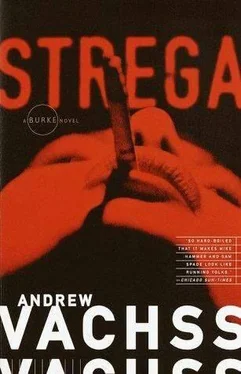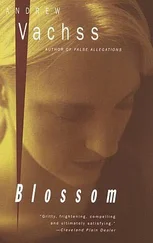I went back into the other room and got a piece of mirror glass with a small red dot painted in the middle. I set it up so I was comfortable and sucked a deep breath in through my nose and down into my stomach, expanding my chest when I exhaled. I kept working on this, taking the air deeper and deeper each time, forcing it down to my lower stomach and then to my groin. I kept watching the dot, waiting to go inside, setting my mind to take this problem with me. The dot got bigger and bigger, filling the surface of the mirror. I concentrated on the sound of my own breathing, picturing the breath moving inside my body, waiting for it to happen. Images floated in: all gray tones-the prison yard, Julio's lizard eyes, a pool of dark water, a street in the rain. I came out of it slowly, feeling the cold spot between my shoulder blades. My hands were shaking.
I lit a cigarette, blew the smoke at the ceiling. The old man was trying to tell me something, and him wanting me to do the job for the girl was only part of it. I didn't need the dough, for a change. The girl wasn't going to lay off, and the old man wouldn't call her off. I should never have taken any work from Julio. My parole officer used to have a sign in his office: "Today Is the First Day of the Rest of Your Life." Sure. The trick is to make sure the first day isn't the last day.
I wanted to sleep for a while, but I knew what that meant. I wasn't tired, just depressed. And scared. It was safe in my office, so I wanted to stay. Some guys tried to sleep through their whole bit in prison. You could get all the medication you wanted from the unlicensed reject that passed for a doctor, and they let you have a TV in your cell too. But when they finally open the door, you could get killed while you were blinking at the light.
I always know what the right thing to do is-the hard thing. So I gave Pansy a pat, told her I'd bring her back a treat, and hit the street to buy some time.
IPULLED out of the garage thinking about what I'd need to cover my trail. The Plymouth is legally registered-to Juan Rodriguez, who lives in an abandoned building in the South Bronx. I wasn't worried about it being traced to me: in the South Bronx, every abandoned building has dozens of registered voters-they never miss an election.
You have to change with the times-using Juan Rodriguez as an alias today was like using John Smith thirty years ago.
The name "Burke" was legally registered too-I took some of the cash from a decent score a few years ago and invested fifteen grand in a piece of a junkyard in Corona, a Queens neighborhood that's Italian to the south and black to the north, with an expanding seam of Puerto Ricans down the middle. I'm on the books as a tow-truck driver. Every two weeks, the owner mails a check for my salary to the post-office box I keep at the main station, across from Madison Square Garden. I cash the checks at this bar near the junkyard and give everything but fifty bucks back to the junkyard owner. It's a good deal for both of us: he gets a business deduction for paying an employee and I get a W-2 form and a legit source of income in case anyone asks. The owner even throws in a set of dealer plates I can legally slap on any car when I do salvage work for him. I give the desk clerk at the hotel where I used to live ten bucks a week for insurance, and I'm covered all the way around. If I get arrested, the desk clerk verifies that I'm a permanent guest and the pay stubs do the rest-I'm a citizen.
I use money orders to pay the yearly registration on the Plymouth. Juan Rodriguez is a straighter shooter: he pays his bills, never gets a parking ticket, and he's never in an accident. He insures the Plymouth through this outfit in the Bronx which specializes in cheap coverage. He even votes regularly. Not only that, he lends me his car whenever I ask him, and he's in no hurry to get it back.
When I have to use the Plymouth on a job, I get the Mole to strip off the paint. The cops are used to seeing old cars in the process of getting painted, especially in the neighborhoods I work. I also have some vinyl sheets in different colors I can just press right over the paint. That kind of cover doesn't last long, but I only use it for a few hours and then pull it off. The Mole has thousands of license plates in his joint-he takes a couple of them and splits them in half, then welds two halves together to make a new set of plates that won't come up on any computer.
Julio wasn't the only reason I had to see the redhead-I had to find out what she knew about me and then go back and erase the tapes.
As I drove through Chinatown, afternoon was fading into evening. The streets were clogged with women making their way home from the sweatshops-their eyes were down and their shoulders slumped, the only hope in their hearts that their children would have a better life. And as they walked from the blackout-curtained rooms, where a straw boss watched their half-paralyzed fingers fly over the sewing machines, to their walk-up apartments with toilets in the hall, other children took over the streets. But these children had no dreams. The Blood Shadows-they took their name from the chalk outline the police coroner draws around a body on the sidewalk. Wearing their trademark black leather coats, silk shirts, and glistening black shoes, they were living proof that hell is cold. The newspapers called them a "street gang," but they were nothing like the bopping gangs from East Harlem or the South Bronx. No cutoff dungaree jackets with their colors on the back for these boys. And no social workers either. Every year Hong Kong disgorges more of them, nobody knows how they get here, but they keep on coming. And America tolerates it like any toxic-waste dump as long as there's money in it for somebody. The Blood Shadows disdain common street mugging-they don't do their gang fighting with knives and chains. Chinatown runs on gambling and dope-organized extortion of these industries forms the Holy Triad, and the Blood Shadows were the sole survivors of a territorial war with other cliques for vulture's rights. The other gangs either merged with the Blood Shadows or got very dead. That left the old guard-what was left of the Tongs.
The old men had first tried to recruit the Hong Kong boys to their own use, but that wasn't working anymore. The old men retreated deeper and deeper into the networks they had spent years developing-but all their political contacts were useless against young boys with flat eyes and hungry guns, kids who didn't play by the rules. The old folks didn't have a chance. They had to import muscle while the kids were growing their own.
I nosed the Plymouth through the alley in back of the warehouse. Clotheslines stretched across the alley, and children ran past, shrieking at each other in a mixture of English and Cantonese. The kids were like birds in a jungle-everything was safe as long as they were making noise. When they went silent, a predator was walking the trails.
I pulled around the front and into the garage. I left the engine running while I pulled the door closed behind me. The Mole had once offered to wire the door so a light would blink and tell Max someone was around, but Max bowed his thanks and said he didn't need it.
I wasn't going to call the redhead from anyplace that could be traced-with cocaine accounting for half the gross national product of the city, half the pay phones in town have been tapped by one agency or another. I'd have to wait for an hour or two anyway. When Max didn't materialize on the landing at the back of the garage, I made a pillow out of my jacket, put it against the passenger door, and stretched out. I put on a Judy Henske tape and listened to her raw-silk voice sing "If That Isn't Love" while I smoked a cigarette in the soft darkness of the garage.
Читать дальше












